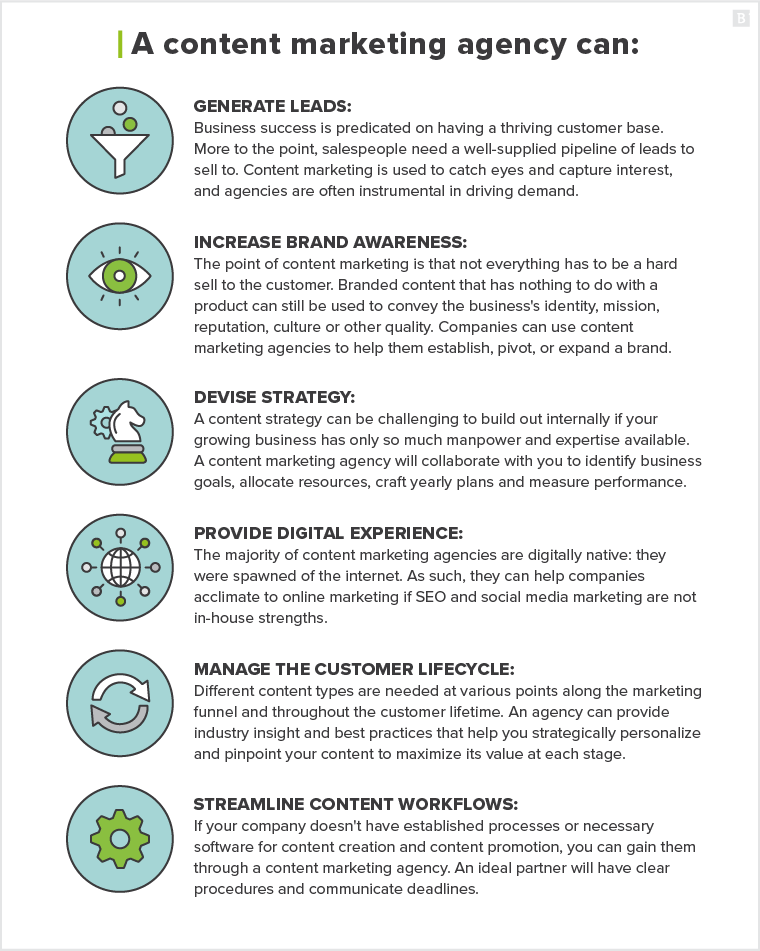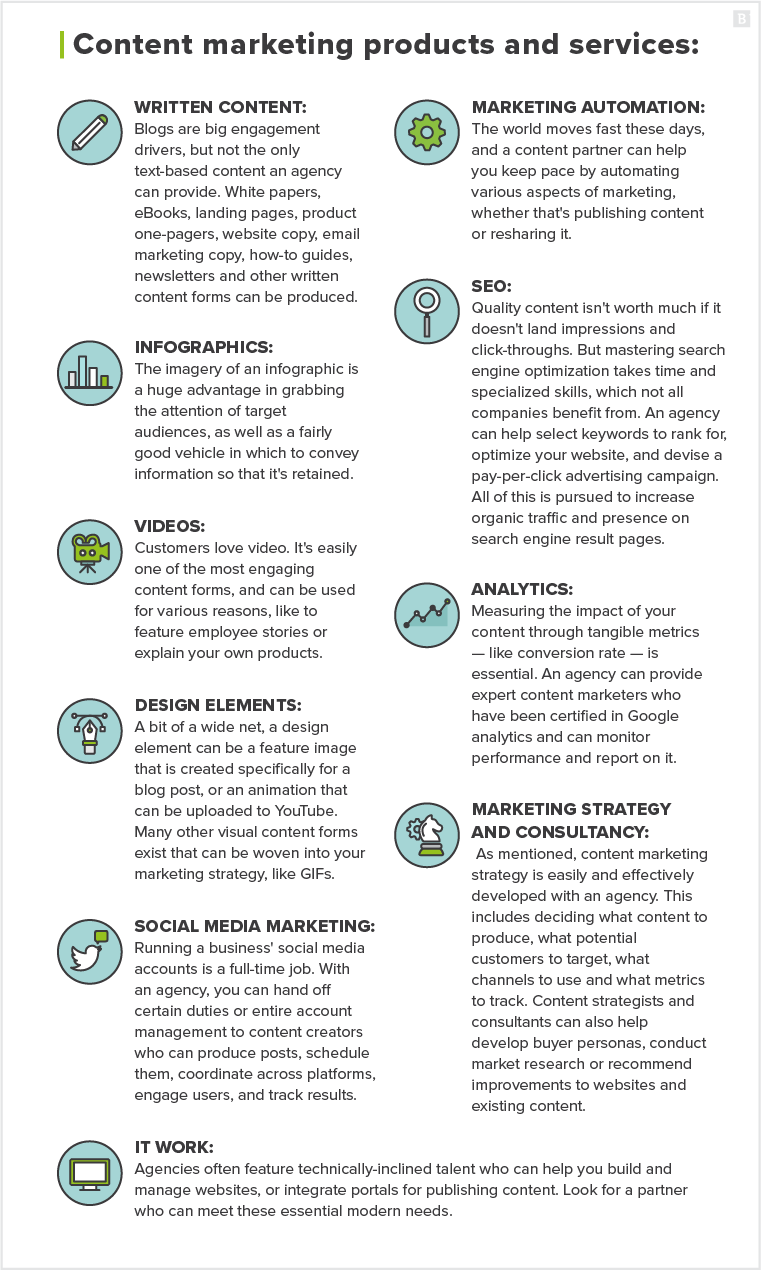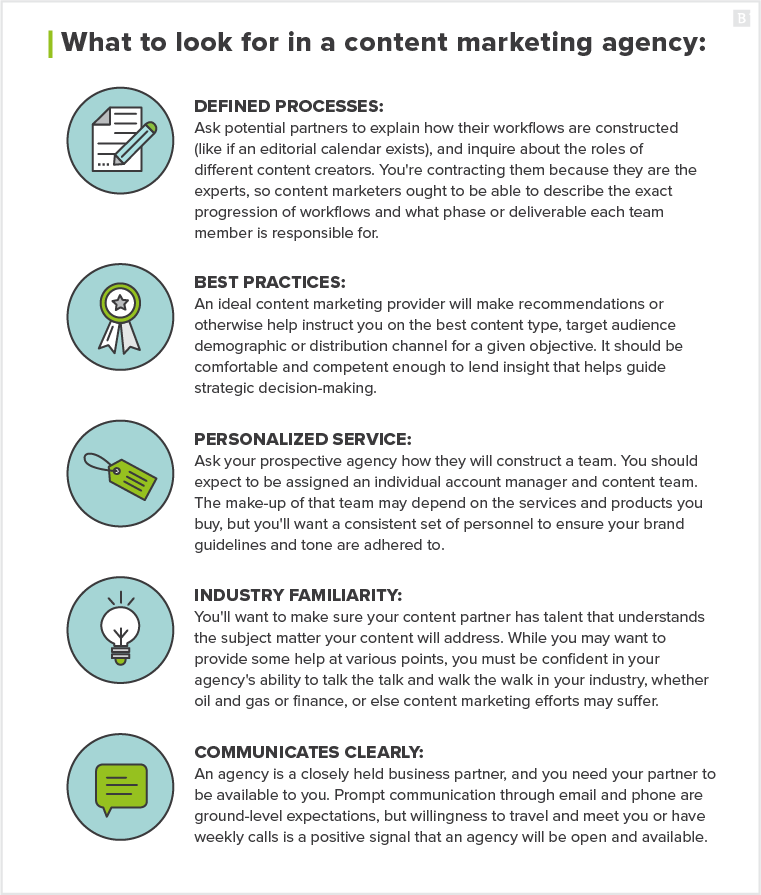Content marketing agencies help businesses create content and develop strategy. Such partners are crucial in engaging customers and elevating brand awareness through various products and services, such as blogs, infographics, SEO and consultancy. Read more about what content marketing agencies do and how to find one.
If I had a dollar for every time I had to explain content marketing and my job to family or friends — well, let’s just say I’d be living that Elon Musk life.
But this is 2019, grandma! Content marketing is far from an emerging strategy. Increasingly, it’s more like a fundamental corner of an overall marketing plan, and businesses of all industries and sizes are investing heavily in blog posts, visual content and social media marketing.
However, the fog of confusion can still cloud the answers to certain questions: Such as “what is a content marketing agency?” or “how can a content marketing agency help me?”
Content marketing is far from an emerging strategy. It’s more like a fundamental corner of an overall marketing plan.
Not every business will have the time, talent, resources or budget required to succeed in content marketing. That’s where content marketing agencies come in, which are able to shoulder your entire content need or pitch in where you need specialized assistance.
What is content marketing?
A succinct description of content marketing and its primary objective is to reach, engage and inspire customers to act, as well as to craft, maintain and elevate brand awareness.
Content isn’t exactly new.
Think about hundred-page product catalogs that department stores of old would send to consumer households, or brochures for travel and training manuals for workplaces. Each represents a content type and a way that businesses use educative materials to interact with customers.
The difference in modern content marketing is that these assets — whether blog posts, social media posts or infographics – are leveraged with highly specific business goals and metrics in mind.
Content marketing is also inbound marketing.
Instead of cold-calling prospects, you can get potential customers to come to you. Outbound marketing would entail the business making the first move, whereas inbound marketing depends on organic traffic driven to the site by blog posts, social media posts or email marketing, for example.
What is a marketing agency?
As opposed to marketing firms, which may specialize in one or two areas, agencies are often full-service business partners that can provide robust marketing services, products and expertise.
Agencies are more familiar as the sprawling entities that have diverse workforces and business units. They help in numerous ways, whether by conceptualizing marketing campaigns, managing a website, hammering out content strategy, doing market research, providing content creation, handling social accounts, or tracking KPIs.
Agencies are often full-service business partners that can provide robust marketing services, products and expertise.
Realistically, agencies will do what their clients want, so the list is nearly infinite.
What can a content marketing agency do for you?
Armed with the knowledge of these definitions, it’s possible to imagine what a content marketing agency would look like and do.
Commonly, agencies have a skilled workforce of content writers, editors, consultants, content strategists, project managers, videographers, content marketers, IT professionals, illustrators, graphic designers, salespeople, account managers and many more. Agencies often need efficient management solutions for diverse teams; an Employment Hero review might show how it helps content marketing agencies streamline HR processes.
As such, the types of services and products they offer are broad, from search engine optimization consultancy to writing email marketing campaigns and social media content promotion.
We’ll get into those specifics more in a bit, but it’s important to zoom out and consider why and how businesses contract content marketing agencies at all. In general, they do so because these partners can:

- Generate leads: Business success is predicated on having a thriving customer base. More to the point, salespeople need a well-supplied pipeline of leads to sell to. Content marketing is used to catch eyes and capture interest, and agencies are often instrumental in driving demand.
- Increase brand awareness: The point of content marketing is that not everything has to be a hard sell to the customer. Branded content that has nothing to do with a product can still be used to convey the business’s identity, mission, reputation, culture or other quality. Companies can use content marketing agencies to help them establish, pivot, or expand a brand.
- Devise strategy: A content strategy can be challenging to build out internally if your growing business has only so much manpower and expertise available. A content marketing agency will collaborate with you to identify business goals, allocate resources, craft yearly plans and measure performance.
- Provide digital experience: The majority of content marketing agencies are digitally native: they were spawned of the internet. As such, they can help companies acclimate to online marketing if SEO and social media marketing are not in-house strengths.
- Manage the customer lifecycle: Different content types are needed at various points along the marketing funnel and throughout the customer lifetime. An agency can provide industry insight and best practices that help you strategically personalize and pinpoint your content to maximize its value at each stage.
- Streamline content workflows: If your company doesn’t have established processes or necessary software for content creation and content promotion, you can gain them through a content marketing agency. An ideal partner will have clear procedures and communicate deadlines.
What products and services do they provide?
While each agency will have its own menu of offerings, the gamut of possible products and services run the gamut. You can expect a content marketing partner to provide:

- Written content: Blogs are big engagement drivers, but not the only text-based content an agency can provide. White papers, eBooks, landing pages, product one-pagers, website copy, email marketing copy, how-to guides, newsletters and other written content forms can be produced.
- Infographics: The imagery of an infographic is a huge advantage in grabbing the attention of target audiences, as well as a fairly good vehicle in which to convey information so that it’s retained.
- Videos: Customers love video. It’s easily one of the most engaging content forms, and can be used for various reasons, like to feature employee stories or explain your own products.
- Design elements: A bit of a wide net, a design element can be a feature image that is created specifically for a blog post, or an animation that can be uploaded to YouTube. Many other visual content forms exist that can be woven into your marketing strategy, like GIFs.
- Social media marketing: Running a business’ social media accounts is a full-time job. With an agency, you can hand off certain duties or entire account management to content creators who can produce posts, schedule them, coordinate across platforms, engage users, and track results.
- Marketing automation: The world moves fast these days, and a content partner can help you keep pace by automating various aspects of marketing, whether that’s publishing content or resharing it.
- SEO: Quality content isn’t worth much if it doesn’t land impressions and click-throughs. But mastering search engine optimization takes time and specialized skills, which not all companies benefit from. An agency can help select keywords to rank for, optimize your website, and devise a pay-per-click advertising campaign. All of this is pursued to increase organic traffic and presence on search engine result pages.
- Analytics: Measuring the impact of your content through tangible metrics — like conversion rate — is essential. An agency can provide expert content marketers who have been certified in Google analytics and can monitor performance and report on it.
- IT work: Agencies often feature technically-inclined talent who can help you build and manage websites, or integrate portals for publishing content. Look for a partner who can meet these essential modern needs.
- Marketing strategy and consultancy: As mentioned, content marketing strategy is easily and effectively developed with an agency. This includes deciding what content to produce, what potential customers to target, what channels to use and what metrics to track. Content strategists and consultants can also help develop buyer personas, conduct market research or recommend improvements to websites and existing content.
These are the core products and services most agencies offer, but the menu can stretch on.
Most agencies will bend the limits to do something a client wants, like an augmented reality product catalog, a hybrid white paper/eBook or something entirely off the beaten path. Special projects are a regular workload for content marketing agencies.
What to look for in a content marketing agency
Agencies are like a swiss-army tool for marketing.
They are incredibly valuable partners who can take some of the burden off your core staff so they are allowed to do what they do best, while the agency also does what it does best. Ideally, this helps you achieve marketing excellence, generate brand awareness, and acquire and retain customers.
Yet not all agencies are created equal.
Finding the right partner means scrutinizing what an agency can offer, as well as its culture and its track record. Some things to look for in a quality content marketing agency include:

- Defined processes: Ask potential partners to explain how their workflows are constructed (like if an editorial calendar exists), and inquire about the roles of different content creators. You’re contracting them because they are the experts, so content marketers ought to be able to describe the exact progression of workflows and what phase or deliverable each team member is responsible for.
- Best practices: An ideal content marketing provider will make recommendations or otherwise help instruct you on the best content type, target audience demographic or distribution channel for a given objective. It should be comfortable and competent enough to lend insight that helps guide strategic decision-making.
- Personalized service: Ask your prospective agency how they will construct a team. You should expect to be assigned an individual account manager and content team. The make-up of that team may depend on the services and products you buy, but you’ll want a consistent set of personnel to ensure your brand guidelines and tone are adhered to.
- Industry familiarity: You’ll want to make sure your content partner has talent that understands the subject matter your content will address. While you may want to provide some help at various points, you must be confident in your agency’s ability to talk the talk and walk the walk in your industry, whether oil and gas or finance, or else content marketing efforts may suffer.
- Communicates clearly: An agency is a closely held business partner, and you need your partner to be available to you. Prompt communication through email and phone are ground-level expectations, but willingness to travel and meet you or have weekly calls is a positive signal that an agency will be open and available.
When searching for an agency to work with, word-of-mouth referrals from other business leaders or connections can help. Reading reviews online is another way to find potential partners.
These are some lists where you can find in-depth client reviews:
- Clutch: Top Content Marketing Companies
- Design Rush: Top 20 Massachusetts Content Marketing Agencies
- The Manifest: Top 100 Content Marketing Agencies
Just be sure to research what the content marketing agency in question offers. This is to ensure that products and services align with your needs.
Don’t forget to forecast your future needs, as you may want to get into video at a later time, for example, but need to build out a text-based content library first. Also inquire about flexibility of contracts and other specifics to the vendor relationship.





